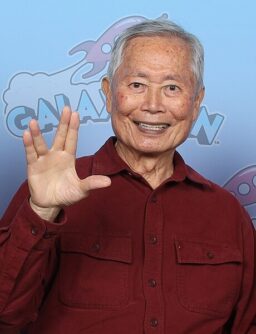When George Takei takes the stage at Huntington’s Cinema Arts Center on Tuesday, Oct. 15, he’ll undoubtedly be warmly embraced by a fan base acknowledging the niche he carved out playing Hikaru Sulu on the original Star Trek. And while the 87-year-old Takei (pronounced tuh-kay) is grateful for the ongoing love affair afforded him by being regularly identified for this seminal acting role, he’s also grateful that it has allowed him to use it as a platform as a social crusader for liberal causes, primarily LGBTQ and immigrant rights. The latter has been a particular passion for him driven by his experiences as a young boy imprisoned with his family in several American internment camps for Japanese Americans in response to the bombing of Pearl Harbor.

“I was a five-year-old child when I was incarcerated by the United States,” he explained. “The first [camp] was in Santa Anita at a race track housed in a horse stable. Then we were moved to the one farthest east in the county which was right in the swamps of Arkansas just a few miles from the Mississippi River. They destroyed my father’s business. They took our bank account. We had no money, so we didn’t pay the mortgage on the house. After the soldiers came and took us away, the bank sold it and kept the money. They impoverished and humiliated us. The country was swept up in hysteria. Japanese Americans were being assaulted and Roosevelt got swept up in that. He issued Executive Order 9066—all 125,181 Japanese Americans on the West Coast were to be interred.”
This particularly shameful chapter of American history has been a constant theme in his career dating back to 1960’s Hell to Eternity, a World War II drama biopic starring Jeffrey Hunter in which the Japanese American internment served as a backdrop (“We shot that in Vancouver, British Columbia and the producers did an amazing job recreating this an anonymous camp.”)
And while Takei testified as a witness for a government commission studying the impact of Executive Order 9066 in 1981, he amped up his educational efforts about internment starting with his 1994 memoir, To the Stars: The Autobiography of George Takei. His efforts have continued in myriad ways including the release of the 2014 documentary To Be Takei (which will be screened at his Cinema Arts Centre appearance) and the release of the 2019 graphic novel The Called Us Enemy.

Takei has followed up on that with My Lost Freedom: A Japanese American World War II Story. This recently released children’s book was inspired by the California native’s interactions with Japanese Americans he met after performances of Allegiance, the musical that doubled as his legacy project about his internment experience. Many of them didn’t know their own family’s experiences beyond knowing their older relatives might have been internees.
“A whole generation of Japanese Americans are growing up only knowing that their parents or grandparents were in camp, but they don’t know the details or even the names of the camps or where they were,” Takei explained. “I’ve been doing all this because this is an important chapter of American history and Americans should know about it. After my Allegiance experience, I knew I had an even greater calling or mission to educate younger Japanese Americans because there is a blank in their family history. They Called Us Enemy was targeting teens and people in their early 20s. But with My Lost Freedom, there was a way to reach two generations—parents and children–with one book.”
Since Takei publicly revealed his sexual orientation in 2005, he has been vocal about LGBTQ rights, announcing that he and longtime partner Brad Altman would become the first same-sex couple to apply for a marriage license in West Hollywood in 2008. The couple’s relationship is the centerpiece of To Be Takei, an important part of the actor talking about his gradual awakening as a gay man.
“I never came out to my father whom I learned so much about who I am because he passed [in 1976],” Takei said. “Being gay is social ostracism. I grew up behind barbed wire fences. But after I was released from that, when I was about nine or 10, I discovered that I was imprisoned in another invisible barbed wire fence. My acting instinct found me having girlfriends, going on double dates and learning to live a double life.”
With another book set for release next year with subject matter he’s contractually unable to discuss, Takei is happy to continue his role as a celebrity activist.
“Americans are woefully uneducated,” he said. “I’m an actor. I’m not an educator or a teacher. But I bring my soapbox along with me and do a little pontificating.”
Takei will be appearing on Oct. 15 at Cinema Arts Centre, 423 Park Ave., in Huntington. Visit www.cinemartscentre.org or call 631-423-7610 for more information.































